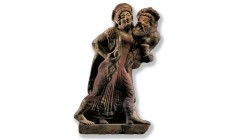Lies, damned lies, and archaeologists: antiquities trafficking research as criminology and the ethics of identification
Yates, D. (2014) ‘Lies, damned lies, and archaeologists: antiquities trafficking research as criminology and the ethics of identification’, AP: Arqueología Pública Special Volume, 1.
By definition, our interactions with those that we consider to be ‘extra-disciplinary’ are predicated on our own self-identification as archaeologists. It isn’t news that some stakeholders react negatively to archaeologists. To them, we are not neutral, well-meaning stewards of the past, but rather a competing group that doesn’t compromise and stifles dissent by claiming a mandate on defining ‘the public good’. How can I effectively engage with such groups when my identity as an archaeologist is unforgivable? Perhaps the archaeologist must leave archaeology.
This paper is about transitioning from a PhD in archaeology to a post doctoral fellowship in a criminology department. As part of the University of Glasgow’s Trafficking Culture project, I study the looting of archaeological sites and the illicit trafficking of cultural property. For half a century archaeologists have clashed with antiquities intermediaries, collectors, and dealers leaving wounds and scars on both sides. These folks will not engage with an ‘archaeologist’, but they are willing to talk to a ‘sociologist’ or even a ‘criminologist’ which is how I now present myself. This paper will focus on the ethical issues of disciplinary labelling. What are the primary benefits of presenting myself as ‘extra-archaeological’? Of not asserting archaeological expertise? Am I obliged to reveal my archaeological background? Does this change of discipline have a tangible effect on the research that I conduct? Do I protect cultural property or protect informants? Am I still an archaeologist?
